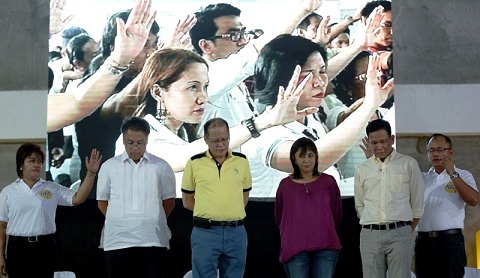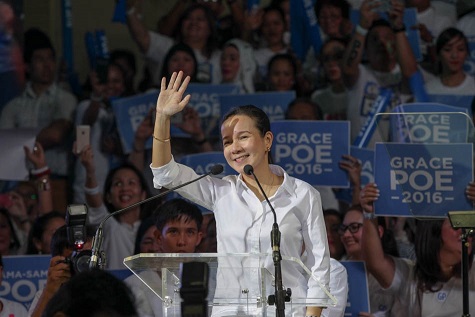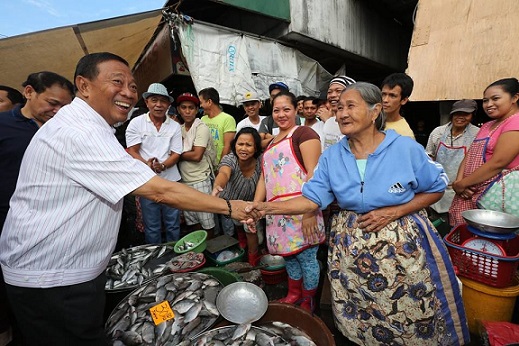
Pres. Aquino with LP candidates Mar Roxas and Leni Robredo being prayed over at the Tarlac First Baptist Church. (Photo by Joseph Vidal, Malacanang)
Candidates for the 2016 May elections, especially those running for president and vice-president, should read the findings of the EON’s 2015 Philippine Trust Survey which tells that Filipinos want from their leaders to listen to and feel for them.
The PTI, which EON started in 2011, is not an easy survey to do because unlike other surveys that ask who they would vote for in the next election, trust is an abstract thing. One has to give it to EON for coming up with a formula to measure the public’s insights and opinions.
In the PTI survey, respondents were asked to share their opinions on six key Philippine institutions – the Government, the Business Sector, the Media, Non-Governmental Organizations, the Church, and the Academe.
The nationwide survey interviewed 1,620 Filipinos from July to August 2015. They are referred to in the survey as “General Public.” EON said an additional 420 screened respondents were also added to come up with 600 respondents referred to in the survey as “Informed Public.”
The Informed Public respondents “are Filipinos who are at least college graduates and who access media for news at least thrice a week,” EON said.
In the survey results, the Informed Public is less approving of the institutions than the General Public.
Due to space limitation, I will focus on the findings on the trust level of the General Public.
This year’s findings showed the Church remains to be the most trusted institution in the country (73 %) followed by the Academe (51%).
Despite criticisms about the Church, Roman Catholic or other religious groups, it is still the sturdy anchor in troubled times for many Filipinos. The Church holds together families and communities.
It is not hard to imagine that the charismatic Pope Francis has helped strengthened the faith of many Catholics in the country.
Media is third most trusted institution ((32%), being the source of information. It’s one percent down from last year’s 33%.
The least trusted are Government (12%), business (9%), and NGOs (9%).
Mistrust towards business is understandable. The common impression of the public of businessmen are people whose only concern is the color of money and without compassion.
I imagine that the negative perception of the public on NGOs has been influenced by the PDAF (Priority Development Assistance Fund) and Janet Napoles scandal.
On Government, the PTI said, “For Filipinos, listening to feedback and opinion and genuine concern for people are the two most important qualities of government and business leaders.”
Another attribute that respondents look for in a government leader is “having a strong political will.”
EON said, “Only two out of ten Filipinos agree that government leaders today possess these top three important qualities.”
Is anybody surprised?
Junie del Mundo, CEO and Chairman of EON The Stakeholder Relations Group, said “Our findings on the most valued leadership qualities further underlines the importance of conversation and communication in building trust for public and private institutions.”

